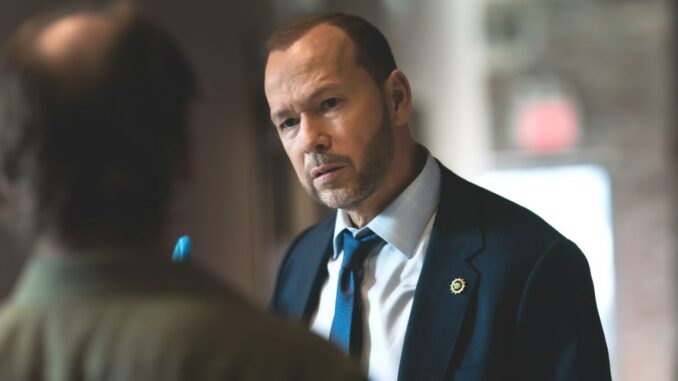
Season 14 of Blue Bloods continues to deliver its signature mix of family dynamics and crime-solving. However, Episode 16, titled “The Gray Areas,” highlights a recurring criticism of the show: its tendency to oversimplify complex issues. While the hour provides the heartwarming moments fans expect, it doesn’t quite rise to the potential that a show in its 14th season should aim for.
In this episode, the Reagan family tackles three separate storylines, each involving moral dilemmas, public perception, and the resolution of cases. While the episode has its strengths, the resolutions feel a bit too clean-cut, leaving viewers craving more depth and realism.
Frank Reagan vs. Political Gamesmanship
The main storyline revolves around NYPD Commissioner Frank Reagan (Tom Selleck) grappling with a PR nightmare after a veteran officer, Sergeant Ray Russo, becomes a political pawn. Russo is praised for his bravery in a dangerous subway assault but is later exposed as having made reckless decisions, leading to questions about his judgment. Mayor Chase (Dylan Walsh) uses Russo as a symbol of heroism, offering him a fabricated role to advance his own agenda.
Frank, as always, sees through the charade. The narrative plays into his character’s long-standing skepticism of political maneuvering, but it also reinforces a predictable formula: Frank doubts himself briefly before ultimately being proven right. While it’s satisfying to watch Frank hold his ground, the storyline doesn’t explore the broader implications of using officers as political props. The resolution feels rushed, with no meaningful exploration of the impact on the NYPD’s morale or public trust.
Dylan Walsh’s portrayal of the mayor adds a layer of intrigue to the plot, but the script doesn’t give him much room to challenge Frank effectively. The potential for a deeper conversation about systemic issues in law enforcement is left untapped, making this subplot feel like a missed opportunity.
Erin Reagan’s Lesson in Perception
Assistant District Attorney Erin Reagan (Bridget Moynahan) navigates her own challenges as she faces criticism from a mock trial winner turned defendant. Christopher, a young man who once admired Erin, accuses her of being overly judgmental after finding himself on the other side of the legal system.
While this storyline has potential, it falters in execution. Christopher’s dramatic shifts in attitude—admiration, disdain, and back to admiration—feel contrived. The character exists solely to allow Erin to deliver a lesson, robbing the subplot of emotional weight. Erin’s confrontation with Christopher could have been a compelling exploration of how public figures in the justice system are perceived, but the writing lacks nuance.
The highlight of this arc is guest star Okieriete Onaodowan, who brings charisma to the role of Christopher. However, even his strong performance can’t fully elevate a storyline that feels overly engineered to serve Erin’s narrative.
Danny and Baez’s Predictable Case
Detectives Danny Reagan (Donnie Wahlberg) and Maria Baez (Marisa Ramirez) tackle the death of an MMA fighter, seemingly thrown out of a window in the lead-up to a major fight. This storyline, while visually dynamic, falls victim to Blue Bloods’ tendency to rely on formulaic case-of-the-week plots.

From the moment match-fixing is mentioned, the outcome becomes predictable. The real culprits turn out to be a group of enforcers and the victim’s coach, with little effort to add twists or depth to the investigation. While the MMA backdrop adds some flashy moments, such as weigh-ins and fight sequences, it doesn’t compensate for the lack of complexity in the narrative.
Another noticeable flaw is the lack of continuity from the previous episode. Danny narrowly escaped death in Episode 15, but neither he nor Baez acknowledges the incident. This omission feels jarring, as it would have been natural for Baez to check in with her partner after such a close call. Instead, their dynamic remains unchanged, and the show misses an opportunity to deepen their relationship.
The Reagan Family’s Signature Fix-All Approach
One of Blue Bloods’ defining traits is its focus on the Reagan family dinner, where the characters come together to reflect on their experiences. These scenes often provide emotional grounding for the show, but they also highlight a recurring issue: the Reagans are portrayed as moral arbiters who always find the right solution.
In “The Gray Areas,” this dynamic is more pronounced than ever. Each Reagan family member resolves their respective challenges neatly, with little room for ambiguity or lasting consequences. While this approach contributes to the show’s feel-good appeal, it can also make the storytelling feel superficial.
The title of the episode suggests a focus on moral complexity, but the narrative rarely ventures into genuinely gray areas. Instead, it reinforces the Reagans’ infallibility, which can be frustrating for viewers hoping for more layered storytelling.
Strengths of the Episode
Despite its flaws, “The Gray Areas” isn’t without its merits. The performances, as always, are strong. Tom Selleck brings gravitas to Frank’s moral dilemmas, while Bridget Moynahan and Donnie Wahlberg shine in their respective storylines. The guest stars, particularly Dylan Walsh and Okieriete Onaodowan, add depth to the episode, even if their characters are underutilized.
Visually, the MMA subplot stands out for its dynamic fight scenes and vibrant settings. These moments inject energy into the episode, even if the plot itself is predictable.
Room for Improvement
As Blue Bloods approaches its series finale, episodes like “The Gray Areas” highlight the need for more ambitious storytelling. The show has always thrived on its balance of family drama and procedural elements, but it risks becoming stagnant when it relies too heavily on formulaic resolutions.

The writers have an opportunity to delve deeper into the characters’ struggles and explore the complexities of their roles in law enforcement and the justice system. By embracing moral ambiguity and allowing the Reagans to face real consequences, Blue Bloods can deliver a more impactful conclusion to its storied run.
Final Thoughts
While “The Gray Areas” offers the comforting familiarity that fans of Blue Bloods have come to love, it also underscores some of the show’s persistent weaknesses. The episode’s overly neat resolutions and lack of genuine complexity leave much to be desired. As the series heads toward its finale, there’s hope that the remaining episodes will embrace the depth and nuance that have made Blue Bloods a beloved staple of network television.
For now, Episode 16 serves as a reminder of the show’s strengths and its missed opportunities, leaving fans eager to see how the Reagan family’s story will ultimately conclude.
